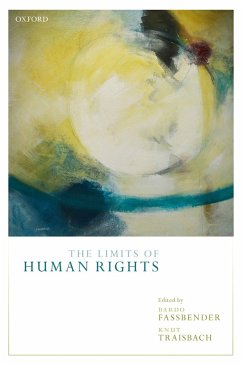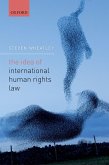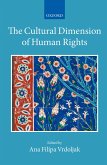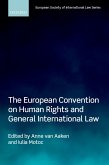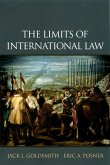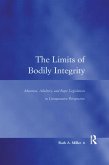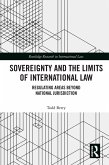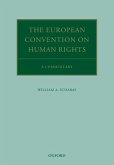The Limits of Human Rights (eBook, PDF)
Redaktion: Fassbender, Bardo; Traisbach, Knut


Alle Infos zum eBook verschenken

The Limits of Human Rights (eBook, PDF)
Redaktion: Fassbender, Bardo; Traisbach, Knut
- Format: PDF
- Merkliste
- Auf die Merkliste
- Bewerten Bewerten
- Teilen
- Produkt teilen
- Produkterinnerung
- Produkterinnerung

Hier können Sie sich einloggen

Bitte loggen Sie sich zunächst in Ihr Kundenkonto ein oder registrieren Sie sich bei bücher.de, um das eBook-Abo tolino select nutzen zu können.
What are the limits of human rights, and what do these limits mean? This volume engages critically and constructively with this question to provide a distinct contribution to the contemporary discussion on human rights. Fassbender and Traisbach, along with a group of leading experts in the field, examine the issue from multiple disciplinary perspectives, analysing the limits of our current discourse of human rights. It does so in an original way, and without attempting to deconstruct, or deny, human rights. Each contribution is supplemented by an engaging comment which furthers this important…mehr
- Geräte: PC
- mit Kopierschutz
- eBook Hilfe
- Größe: 26.72MB
![The Idea of International Human Rights Law (eBook, PDF) The Idea of International Human Rights Law (eBook, PDF)]() Steven WheatleyThe Idea of International Human Rights Law (eBook, PDF)78,95 €
Steven WheatleyThe Idea of International Human Rights Law (eBook, PDF)78,95 €![The Cultural Dimension of Human Rights (eBook, PDF) The Cultural Dimension of Human Rights (eBook, PDF)]() The Cultural Dimension of Human Rights (eBook, PDF)98,95 €
The Cultural Dimension of Human Rights (eBook, PDF)98,95 €![The European Convention on Human Rights and General International Law (eBook, PDF) The European Convention on Human Rights and General International Law (eBook, PDF)]() The European Convention on Human Rights and General International Law (eBook, PDF)76,95 €
The European Convention on Human Rights and General International Law (eBook, PDF)76,95 €![The Limits of International Law (eBook, PDF) The Limits of International Law (eBook, PDF)]() Jack L. GoldsmithThe Limits of International Law (eBook, PDF)19,95 €
Jack L. GoldsmithThe Limits of International Law (eBook, PDF)19,95 €![The Limits of Bodily Integrity (eBook, PDF) The Limits of Bodily Integrity (eBook, PDF)]() Ruth A. MillerThe Limits of Bodily Integrity (eBook, PDF)44,95 €
Ruth A. MillerThe Limits of Bodily Integrity (eBook, PDF)44,95 €![Sovereignty and the Limits of International Law (eBook, PDF) Sovereignty and the Limits of International Law (eBook, PDF)]() Todd BerrySovereignty and the Limits of International Law (eBook, PDF)33,95 €
Todd BerrySovereignty and the Limits of International Law (eBook, PDF)33,95 €![The European Convention on Human Rights (eBook, PDF) The European Convention on Human Rights (eBook, PDF)]() William A. SchabasThe European Convention on Human Rights (eBook, PDF)56,95 €
William A. SchabasThe European Convention on Human Rights (eBook, PDF)56,95 €-
-
-
Dieser Download kann aus rechtlichen Gründen nur mit Rechnungsadresse in A, B, BG, CY, CZ, D, DK, EW, E, FIN, F, GR, HR, H, IRL, I, LT, L, LR, M, NL, PL, P, R, S, SLO, SK ausgeliefert werden.
- Produktdetails
- Verlag: Oxford University Press
- Seitenzahl: 416
- Erscheinungstermin: 21. November 2019
- Englisch
- ISBN-13: 9780192558183
- Artikelnr.: 58254812
- Verlag: Oxford University Press
- Seitenzahl: 416
- Erscheinungstermin: 21. November 2019
- Englisch
- ISBN-13: 9780192558183
- Artikelnr.: 58254812
* Prologue: Limits and their Varieties
* Part 1. Limits of Ideas, Limits of Communities: Paradigms and Biases
* 1: Lynn Hunt: Humanity and the Claim to Self-Evidence
* 2: Bardo Fassbender: The Self-Evidence of Human Rights: Origins and
Limits of an Idea
* 3: Kate Nash: Human Rights, Global Justice, and the Limits of Law
* 4: Mark Goodale: Human Rights beyond the Double Bind of Sovereignty:
A Response to Kate Nash
* 5: David Dyzenhaus: Emergencies and Human Rights: A Hobbesian
Analysis
* 6: Conor Gearty: Reason, Faith, and Feelings: A Response to David
Dyzenhaus
* Part 2. Limits of Functions, Limits of Uses: Actors and Practices
* 7: Christian Reus-Smit: Being a Realist about Human Rights
* 8: Basak Çali: Political Limits of International Human Rights: A
Response (or a Rejoinder) to Christian Reus-Smit
* 9: Jan Klabbers: Human Rights Bodies and the Structure of
Institutional Obligation
* 10: Rosa Freedman and Ruth Houghton: Dissecting the Institution: A
Response to Jan Klabbers
* 11: Aryeh Neier: Differentiating Fundamental Rights and Economic
Goals
* 12: Jeremy Perelman: Advocating for Social and Economic
Rights-Critical Perspectives: A Response to Aryeh Neier
* Part 3. Limits of Scope, Limits of Recognition: The Case of Women's
Rights
* 13: Hilary Charlesworth and Christine Chinkin: Between the Margins
and the Mainstream: The Case of Women's Rights
* 14: Bai Guimei: Women's Rights are Human Rights: A Response to Hilary
Charlesworth and Christine Chinkin from a Chinese Perspective
* 15: Martha C. Nussbaum: Women's Progress and Women's Human Rights
* 16: Fareda Banda: The Limits of Law: A Response to Martha C Nussbaum
* Part 4. Limits of Pragmatism, Limits of Compromise: The Case of Armed
Conflict
* 17: Frédéric Mégret: The Limits of the Laws of War
* 18: Knut Traisbach: The Banality of Humanity (as an Absolute): A
Response to Frédéric Mégret
* 19: Andrew Clapham: The Limits of Human Rights in Times of Armed
Conflict and Other Situations of Armed Violence
* 20: Yuval Shany: The End of the War/Peace Limit on the Application of
International Human Rights Law: A Response to Andrew Clapham
* Part 5. Limits of Prospects, Limits of Means: An Outlook
* 21: Mireille Delmas-Marty: The Limits of Human Rights in a Moving
World-Elements of a Dynamic Approach
* 22: Marie-Bénédicte Dembour: Where are the Limits of Human Rights?
Four Schools, four Complementary Visions: A Response to Mireille
Delmas-Marty
* 23: Douglas A. Johnson and Kathryn Sikkink: Strategizing for Human
Rights: From Ideals to Practice
* 24: Micheline Ishay: Historical Strategies for Human Rights: A
Response to Kathryn Sikkink and Douglas Johnson
* Prologue: Limits and their Varieties
* Part 1. Limits of Ideas, Limits of Communities: Paradigms and Biases
* 1: Lynn Hunt: Humanity and the Claim to Self-Evidence
* 2: Bardo Fassbender: The Self-Evidence of Human Rights: Origins and
Limits of an Idea
* 3: Kate Nash: Human Rights, Global Justice, and the Limits of Law
* 4: Mark Goodale: Human Rights beyond the Double Bind of Sovereignty:
A Response to Kate Nash
* 5: David Dyzenhaus: Emergencies and Human Rights: A Hobbesian
Analysis
* 6: Conor Gearty: Reason, Faith, and Feelings: A Response to David
Dyzenhaus
* Part 2. Limits of Functions, Limits of Uses: Actors and Practices
* 7: Christian Reus-Smit: Being a Realist about Human Rights
* 8: Basak Çali: Political Limits of International Human Rights: A
Response (or a Rejoinder) to Christian Reus-Smit
* 9: Jan Klabbers: Human Rights Bodies and the Structure of
Institutional Obligation
* 10: Rosa Freedman and Ruth Houghton: Dissecting the Institution: A
Response to Jan Klabbers
* 11: Aryeh Neier: Differentiating Fundamental Rights and Economic
Goals
* 12: Jeremy Perelman: Advocating for Social and Economic
Rights-Critical Perspectives: A Response to Aryeh Neier
* Part 3. Limits of Scope, Limits of Recognition: The Case of Women's
Rights
* 13: Hilary Charlesworth and Christine Chinkin: Between the Margins
and the Mainstream: The Case of Women's Rights
* 14: Bai Guimei: Women's Rights are Human Rights: A Response to Hilary
Charlesworth and Christine Chinkin from a Chinese Perspective
* 15: Martha C. Nussbaum: Women's Progress and Women's Human Rights
* 16: Fareda Banda: The Limits of Law: A Response to Martha C Nussbaum
* Part 4. Limits of Pragmatism, Limits of Compromise: The Case of Armed
Conflict
* 17: Frédéric Mégret: The Limits of the Laws of War
* 18: Knut Traisbach: The Banality of Humanity (as an Absolute): A
Response to Frédéric Mégret
* 19: Andrew Clapham: The Limits of Human Rights in Times of Armed
Conflict and Other Situations of Armed Violence
* 20: Yuval Shany: The End of the War/Peace Limit on the Application of
International Human Rights Law: A Response to Andrew Clapham
* Part 5. Limits of Prospects, Limits of Means: An Outlook
* 21: Mireille Delmas-Marty: The Limits of Human Rights in a Moving
World-Elements of a Dynamic Approach
* 22: Marie-Bénédicte Dembour: Where are the Limits of Human Rights?
Four Schools, four Complementary Visions: A Response to Mireille
Delmas-Marty
* 23: Douglas A. Johnson and Kathryn Sikkink: Strategizing for Human
Rights: From Ideals to Practice
* 24: Micheline Ishay: Historical Strategies for Human Rights: A
Response to Kathryn Sikkink and Douglas Johnson
